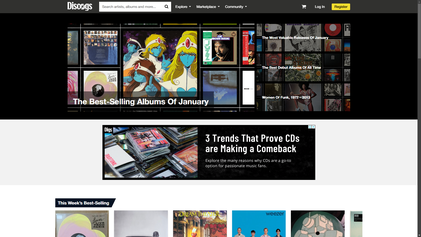In the vast world of music, where millions of albums, singles, and recordings have been produced over decades, keeping track of everything can be an enormous challenge. From obscure underground records to major label releases, the global catalog of music is massive. This is where Discogs comes into play. To understand what “Discog” means, one must look into its origin, purpose, and the vital role it plays in music culture today. In this article, we’ll define Discogs, explore how it works, its importance to collectors and music lovers, and why it has become one of the most respected names in the world of recorded sound.
What Is Discogs? Defining the Term
The word Discogs is short for “Discographies”, which refers to comprehensive listings of sound recordings by artists, labels, or genres. Over time, however, the term has evolved to refer specifically to Discogs.com, a community-built online database that catalogs information about music releases. When people say “Discog” or “Discogs,” they often mean the website itself—a hub where users can find details about vinyl records, CDs, cassettes, and even digital releases.
In simple terms, Discogs is a user-generated database of music releases. It provides detailed information about artists, albums, tracklists, release dates, label details, catalog numbers, cover art, and more. Users can contribute to the database, correct information, or list items for sale, making it both an archive and a marketplace.
The Birth of Discogs
Discogs was founded in 2000 by Kevin Lewandowski, a music enthusiast and software developer from Portland, Oregon. His goal was to create a place where people could catalog and share information about electronic music releases—a genre known for its endless remixes and variations. Initially focused on electronic records, Discogs quickly expanded to include all genres of music, from rock and jazz to hip-hop, classical, and world music.
By opening its doors to contributions from users worldwide, Discogs grew rapidly. Every record added by a collector, DJ, or fan made the platform more comprehensive. Today, Discogs contains millions of releases and is considered one of the largest and most accurate music databases in existence.
How Discogs Works
Discogs operates as both a database and a marketplace. Here’s a breakdown of its two main functions:
1. The Database
At its core, Discogs is a crowdsourced catalog of recorded music. Users can create an account and begin adding entries for releases that aren’t already listed. Each entry typically includes:
- Artist or band name
- Title of the release
- Format (vinyl, CD, cassette, digital)
- Tracklist (songs and versions)
- Label and catalog number
- Year of release
- Country of origin
- Artwork and images
- Barcode or matrix/runout information
This attention to detail makes Discogs a trusted source for verifying music information. Collectors, record store owners, DJs, and archivists use it daily to confirm editions and track rare releases.
2. The Marketplace
In addition to the database, Discogs runs a massive online marketplace where users can buy and sell music. Sellers list their physical media—mostly vinyl records and CDs—while buyers browse through listings from all over the world. Each item includes condition ratings for both the media and its sleeve, allowing for transparent transactions.
What makes the Discogs marketplace special is its accuracy and niche appeal. While mainstream platforms may focus on popular releases, Discogs thrives on rare, out-of-print, and collector’s editions. It’s the go-to destination for those seeking that one hard-to-find record missing from their collection.
Discogs and Vinyl Culture
Vinyl has seen a strong revival over the last decade, and Discogs has played a crucial role in that resurgence. The platform not only connects collectors but also documents vinyl history. Every pressing, variant, and reissue is meticulously recorded, making it easier to identify the exact version of a record.
For example, a famous album like The Dark Side of the Moon by Pink Floyd has hundreds of different pressings, each with small variations in label design, matrix numbers, or country of origin. On Discogs, collectors can view all these editions side by side, complete with photos and details submitted by other users.
This level of precision turns the act of collecting into an educational experience. Users learn about record production, distribution, and even the history of record labels. Discogs thus functions not only as a marketplace but also as a digital museum of recorded music.
Community and Contribution
One of the defining features of Discogs is its community-driven model. Every entry in the database is created and maintained by users, and the site relies heavily on collaboration and accuracy. When a new release is added, other users review it for correctness. If errors or omissions are found, they can propose edits, which are then voted on by the community.
This democratic system of moderation ensures that the database remains reliable and up to date. Over the years, Discogs has attracted a passionate base of contributors who treat it as both a hobby and a mission—to preserve the world’s recorded music heritage for future generations.
The platform also includes forums where members discuss releases, share collecting tips, and connect over shared musical interests. This sense of community is one of the reasons Discogs has remained popular for more than two decades.
Why Discogs Is Important
1. Preservation of Music History
Many recordings, especially from smaller labels or independent artists, might otherwise be forgotten. Discogs ensures they are documented and remembered. Even if a record was pressed in small quantities decades ago, it can find new life in the database.
2. Collector’s Resource
For collectors, Discogs is an invaluable cataloging tool. Users can create their own collections and wantlists, organizing what they own and what they wish to acquire. The platform even allows users to see the estimated market value of their collections based on recent sales data.
3. Marketplace Transparency
Unlike traditional marketplaces, Discogs emphasizes transparency and detail. Sellers must accurately describe the condition of their items using standardized grading systems (such as Mint, Near Mint, Very Good, etc.), which reduces misunderstandings between buyers and sellers.
4. Research and Discovery
Discogs also serves as a research tool for musicologists, journalists, and DJs. Whether you’re tracing the discography of a particular artist or exploring the evolution of a genre, the database provides verified information sourced from real releases.
Discogs Terminology: What You Should Know
To fully understand what Discogs offers, it helps to know some key terms used within the platform:
- Release: A specific version of an album, single, or EP. Different formats or pressings count as separate releases.
- Master Release: The main grouping that contains all versions of a specific recording.
- Label: The company that produced or distributed the release.
- Catalog Number: A unique identifier used by the label to organize its releases.
- Matrix / Runout: The numbers etched into the runout area of vinyl records, used to identify pressing variations.
- Submission: The act of adding a new release or editing an existing entry.
- Collection: A user’s personal list of items they own.
- Wantlist: A list of releases a user wishes to buy or find in the future.
Understanding these terms helps users navigate the platform more effectively.
Discogs and Digital Music
Although Discogs was built around physical media like vinyl and CDs, it has adapted to the modern music landscape. The database now includes digital releases, especially those that exist on platforms like Bandcamp or streaming services. This ensures that Discogs continues to serve as a comprehensive archive, bridging the gap between analog and digital eras.
Still, the site remains most beloved among vinyl enthusiasts. Many collectors appreciate the tactile, nostalgic nature of records, and Discogs gives them a way to connect digitally with a physical passion.
Challenges and Criticisms
Like any large community project, Discogs faces challenges. Some users have pointed out inconsistencies in data, especially when multiple versions of the same release are submitted with minor variations. The reliance on user input means the system can occasionally include errors or duplicates.
Additionally, as the Discogs marketplace has grown, prices for rare records have skyrocketed, leading to debates about the commodification of music collecting. Some argue that the visibility of prices encourages speculation, while others see it as a natural reflection of demand and rarity.
Despite these concerns, the overall reputation of Discogs remains strong. Its commitment to accuracy and transparency continues to set it apart from other platforms.
The Future of Discogs
As of today, Discogs continues to evolve. The company has introduced mobile apps, improved data visualization, and expanded its marketplace tools. In the future, Discogs may integrate more with streaming data, artificial intelligence, and new cataloging technologies.
What will remain constant, however, is its mission: to build the biggest and most comprehensive music database in the world—one entry, one release, one passionate user at a time.
Conclusion: The Meaning of “Discog” Defined
So, what does Discog mean? In essence, it refers to a complete record or listing of music releases, but in modern usage, it has become synonymous with Discogs, the online platform that revolutionized music cataloging and collecting. Discogs defines the bridge between the analog past and the digital present—a living archive where music history is preserved through the collective effort of fans, collectors, and creators.
By understanding and participating in Discogs, we engage in something far greater than buying and selling records. We contribute to the ongoing story of music itself—a shared cultural memory that spans generations, genres, and geographies. Whether you are a seasoned vinyl collector, a casual listener, or a historian of sound, Discogs offers the ultimate resource to explore, document, and celebrate the endless world of recorded music.



